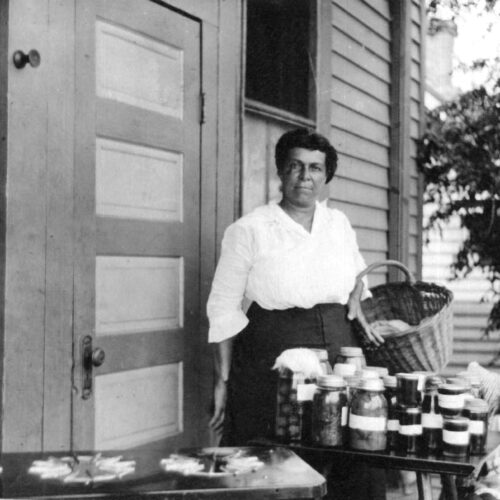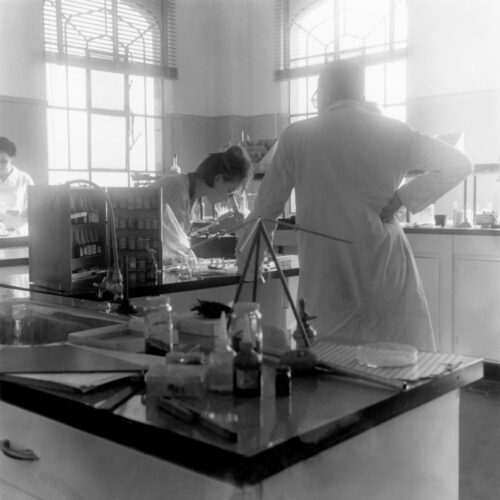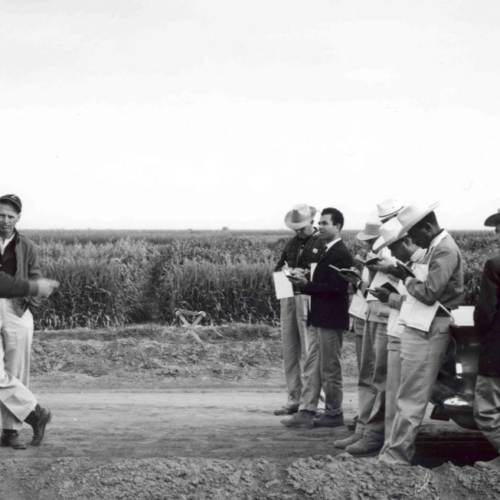In our New Research series, we highlight recently published reports written by researchers who have received RAC travel stipends to pursue their studies in our archival collections. In this edition of the series, the authors have studied materials in a number of collections of personal papers. They include the papers of Donald R. Griffin, Joan Dunlop, John D. Rockefeller 3rd, Abby Aldrich Rockefeller, Blanchette Hooker Rockefeller, Nelson A. Rockefeller, and David Rockefeller. Also cited are records of the Rockefeller University and China Medical Board, Inc., as well as archival materials from the Office of the Messrs. Rockefeller.
“If Human Ears Were Tuned to Bat Frequencies”: Inaudible Sound and the Sciences of Bat Echolocation” by Kathryn Wataha
In “‘If Human Ears Were Tuned to Bat Frequencies’: Inaudible Sound and the Sciences of Bat Echolocation,” Kathryn Wataha analyzes the research of Donald R. Griffin, a zoologist at Harvard and later Rockefeller University, that contributed to our understanding of sound that extends beyond the limitations of human hearing.
Focusing his research on bat navigation, Griffin coined the term “echolocation,“ as he explored how bats interacted with their environment. Accessing his laboratory notebooks, correspondence, publications, new clippings, and sound films, Kathryn Wataha was able to piece together the process of research of a scientist who could not hear the bats directly, other than their “clicks,” but was able to utilize a series of mechanical, visual, and sound apparatuses to discover the mechanisms of bats’ navigation abilities. In her report, she also contextualizes Griffin’s research in mid-20th century historical events, as she discusses how research such as his was of increasing interest to the government, both in World War II and later in the Cold War, as it viewed such scientific sound studies as valuable assets to military activities.
Kathryn Wataha is an MD/Ph.D student at the University of Michigan’s Medical Student Training Program. There, she combines her studies at the medical school with her research interests in sound in the university’s history department.
“’An Obligation and a Conviction to Work for Women Less Fortunate than I Am’: Joan Dunlop, Women’s Reproductive Rights, and the Work of the Population Council” by Charlotte Lydia Riley
Charlotte Lydia Riley’s research report, “’An Obligation and a Conviction to Work for Women Less Fortunate than I Am’: Joan Dunlop, Women’s Reproductive Rights, and the Work of the Population Council” looks at Joan Dunlop’s multi-decade engagement with issues of women’s reproductive rights. Visiting RAC was a valuable opportunity this researcher to compare American approaches to these issues to British ones.
Many of RAC’s archival collections provided Dr. Riley with important insight into Dunlop’s career, as she worked at the Ford Foundation in the 1960s, was hired by John D. Rockefeller 3rd in the early 1970s as an associate to further his population interests, and then worked at the Population Council until the mid-1980s. She paid particular attention to Joan Dunlop’s interactions with JDR 3rd as he was a very high-profile spokesperson and funder for a variety of population-related initiatives. Riley was also interested to see how discussions about women’s reproductive rights shifted in focus over time, in light of the US Supreme Court ruling on Roe v. Wade in 1973.
Charlotte Lydia Riley is a lecturer on contemporary Britain at the University of Southampton with an interest in British development policies, political culture, and gender politics.
“’American Patrick Manson’ Goes to China: Ernest Faust’s Career Path to Peking Union Medical College” by Yubin Shen
Yubin Shen is a historian of modern China since 1800, with strong interest in the history of science, technology, medicine, and the environment. He completed his dissertation on global malaria networks in China at Georgetown University, was a post-doctoral fellow at the Max Planck Institute for the History of Science in Berlin, and has taught at Sun Yat-Sen University in Guangzhou, China. His research at RAC allowed him to explore the archives of the China Medical Board, looking at the formative years of the Peking Union Medical College (PUMC).
In his report, “’American Patrick Manson’ Goes to China: Ernest Faust’s Career Path to Peking Union Medical College,” Dr. Shen traces the early years of a young parasitologist who came to the college to add a new division to its department of pathology. He uses Faust’s career trajectory as a way to highlight the global network that was developing for parasitology. This discussion of Faust’s biography also provides Yubin Shen with an opportunity to present an alternate explanation to the roots of tropical medicine. He offers that Faust’s training and career ambitions suggest that the description of tropical medicine as constituting a form of colonial medicine serving the needs of Euro-American imperial ambitions may need to be modified or reconsidered.
Dr. Shen suggests that tropical medicine should be viewed through a different lens. He argues that parasitology was a dynamic, budding scientific discipline which open up new career paths to young researchers that was built on growing international professional networks of scientists eager to expand it.
Blanchette Rockefeller, Engaged Leadership, and MoMA, 1949-1987
Blanchette Rockefeller’s multi-decade involvement with the Museum of Modern Art is the topic of Evan R. Ward’s research report. “Blanchette Rockefeller, Engaged Leadership, and MoMA, 1949-1987” chronicles the many different positions that she held in helping to steer that cultural icon of modern art.
Blanchette, the wife of John D. Rockefeller 3rd, was a connoisseur of art, a major philanthropic supporter of the museum, and a key leader of it. She served as chair of MoMA’s Junior Council and its International Council, twice as president of the museum, as well as chair of its board of trustees. In studying her deep engagement with the museum, Dr. Ward explored the Blanchette Hooker Rockefeller papers, as well as those of other Rockefeller family members deeply committed to MoMA’s success.
Dr. Ward identifies that Mrs. Rockefeller’s leadership style incorporated her philanthropic vision and strong management skills. He notes that Blanchette’s approach to leadership drew on three key areas. She had an intellectual emphasis, evident in her passion for promoting artistic appreciation; a social component, manifest in her use of collaborative efforts to advance the mission of MoMA; and a readiness to invest her own time, which arguably, in addition to financial support, represented a scarce resource she lavished on the various programs and institutions of the museum.
Evan R. Ward is an associate professor of history at Brigham Young University, specializing in Latin American history and twentieth-century tourism.
About the RAC Research Stipend Program
The Rockefeller Archive Center offers a competitive research stipend program that provides individuals up to $5,000 for reimbursement of travel and accommodation expenses. Learn more on our Research Stipend page



